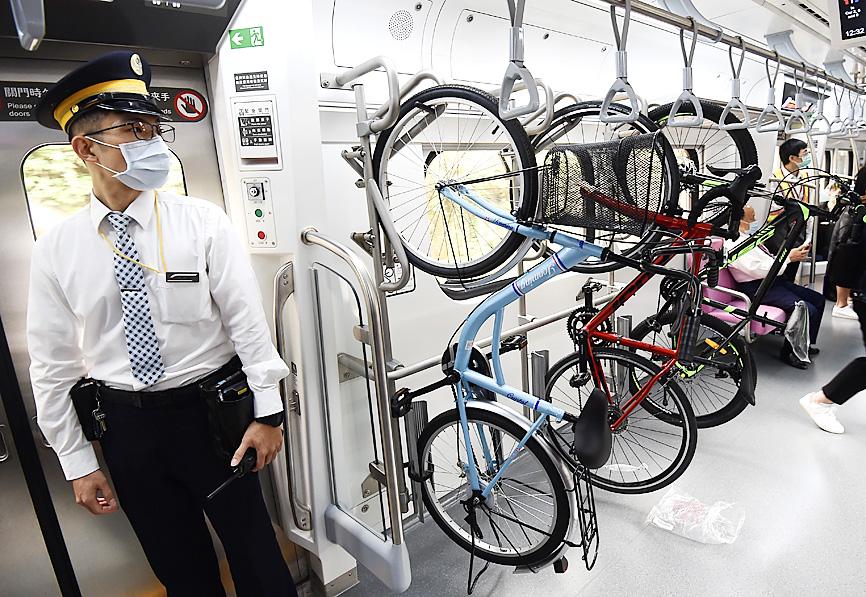The Taiwan Railways Administration’s (TRA) two new EMU900 regional trains are to begin operations on Sunday to transport travelers during the Tomb Sweeping Day long weekend.
President Tsai Ing-wen (蔡英文), Premier Su Tseng-chang (蘇貞昌) and Minister of Transportation and Communications Lin Chia-lung (林佳龍) were among the government officials yesterday afternoon presiding over the train’s inauguration ceremony at Keelung Railway Station, the starting point of the nation’s trunk line.
The two regional trains are part of the operator’s acquisition plan from 2015 to 2024, the TRA said, adding that the plan also includes the purchase of EMU3000 intercity trains.

Photo: Chien Jung-fong, Taipei Times
The addition of the regional and intercity trains to its fleet would greatly increase the agency’s capacity, and enhance the service quality for commuters and long-distance travelers, Tsai said.
“We hope that the TRA will offer quality and safe service, and demonstrate professionalism in the operation, maintenance and deployment of the trains, as well as in customer service,” she said.
New railway systems bring new development opportunities and create new communities, Su said.

Photo: Chien Jung-fong, Taipei Times
The Forward-Looking Infrastructure Development Program has earmarked NT$190 billion (US$6.66 billion) for railway projects, as they are key infrastructure for the country’s development in the next three decades, he said.
Lin said that the new trains are only the beginning, and that the TRA must ensure thorough maintenance of trains and regular trainings for its staff.
The TRA should also enhance reliability and safety, as this would constitute quality service, he said.
The EMU900’s passenger seats are light blue and priority seats are light pink.
The first and 10th cars are equipped with 12 bicycle racks.
The sixth car features priority spaces for wheelchairs that can also be used for baby strollers.
Pregnant women can request a remote control from train staff, which would allow them operate light and sound signals next to priority seats to remind other passengers to yield the seats.
Deputy Minister of Transportation and Communications Chi Wen-chung (祁文中), who also serves as acting TRA director, said that the nation’s regional trains are mostly operated with eight railcars.
However, an EMU900 would have 10 cars, increasing the capacity by 40 percent, he said.
EMU900s are manufactured by South Korea-based Hyundai Rotem.
The remaining 500 EMU900s ordered by the operator are to be delivered in three batches: 100 this year, 120 next year and 280 in 2023, the agency said.
The orders totaled NT$25.3 billion, it said.
The operator has also purchased 600 new railcars for intercity trains from Japan’s Toshiba.
“We will retire old regional trains and intercity trains based on the delivery schedules for new trains,” Chi said.

Chinese Nationalist Party (KMT) Chairman Eric Chu (朱立倫), spokeswoman Yang Chih-yu (楊智伃) and Legislator Hsieh Lung-chieh (謝龍介) would be summoned by police for questioning for leading an illegal assembly on Thursday evening last week, Minister of the Interior Liu Shyh-fang (劉世芳) said today. The three KMT officials led an assembly outside the Taipei City Prosecutors’ Office, a restricted area where public assembly is not allowed, protesting the questioning of several KMT staff and searches of KMT headquarters and offices in a recall petition forgery case. Chu, Yang and Hsieh are all suspected of contravening the Assembly and Parade Act (集會遊行法) by holding

PRAISE: Japanese visitor Takashi Kubota said the Taiwanese temple architecture images showcased in the AI Art Gallery were the most impressive displays he saw Taiwan does not have an official pavilion at the World Expo in Osaka, Japan, because of its diplomatic predicament, but the government-backed Tech World pavilion is drawing interest with its unique recreations of works by Taiwanese artists. The pavilion features an artificial intelligence (AI)-based art gallery showcasing works of famous Taiwanese artists from the Japanese colonial period using innovative technologies. Among its main simulated displays are Eastern gouache paintings by Chen Chin (陳進), Lin Yu-shan (林玉山) and Kuo Hsueh-hu (郭雪湖), who were the three young Taiwanese painters selected for the East Asian Painting exhibition in 1927. Gouache is a water-based

Taiwan would welcome the return of Honduras as a diplomatic ally if its next president decides to make such a move, Minister of Foreign Affairs Lin Chia-lung (林佳龍) said yesterday. “Of course, we would welcome Honduras if they want to restore diplomatic ties with Taiwan after their elections,” Lin said at a meeting of the legislature’s Foreign Affairs and National Defense Committee, when asked to comment on statements made by two of the three Honduran presidential candidates during the presidential campaign in the Central American country. Taiwan is paying close attention to the region as a whole in the wake of a

OFF-TARGET: More than 30,000 participants were expected to take part in the Games next month, but only 6,550 foreign and 19,400 Taiwanese athletes have registered Taipei city councilors yesterday blasted the organizers of next month’s World Masters Games over sudden timetable and venue changes, which they said have caused thousands of participants to back out of the international sporting event, among other organizational issues. They also cited visa delays and political interference by China as reasons many foreign athletes are requesting refunds for the event, to be held from May 17 to 30. Jointly organized by the Taipei and New Taipei City governments, the games have been rocked by numerous controversies since preparations began in 2020. Taipei City Councilor Lin Yen-feng (林延鳳) said yesterday that new measures by